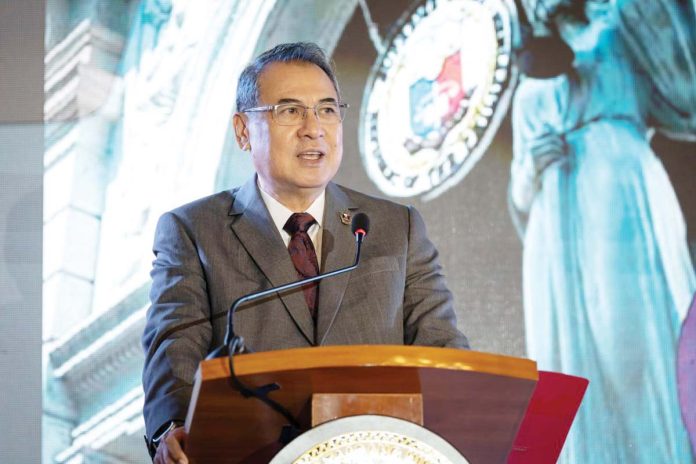
BY GEROME DALIPE IV
ILOILO City – Chief Justice Alexander G. Gesmundo underscored the judiciary’s commitment to mental health support for its personnel in Western Visayas.
The Supreme Court recently hosted its second “SC C.A.R.E.S.” (Courts Achieving Resilience and Excellence through Support) regional summit on mental health, specifically for first- and second-level court judges and employees in Western Visayas.
This initiative focused on equipping court personnel with resources to manage stress and enhance overall well-being, recognizing the unique challenges and pressures they face in the judicial system.
The tribunal aims to foster resilience and productivity by prioritizing mental health, contributing to a healthier and more effective judicial workforce.
In his keynote address, Gesmundo, who also chairs the Supreme Court Governing Council for Mental Health, stressed the critical importance of mental health for all court officers and employees, referring to them as the judiciary’s “primary resources.”
Justice Gesmundo highlighted the direct link between the judiciary’s well-being and its integrity, asserting that supporting judicial personnel’s mental health enables them to perform at their best.
He remarked, “That way we can deliver the highest possible quality of justice we can inspire”, emphasizing that prioritizing mental health is essential for ensuring a just and efficient judicial system.
The summit, held last Oct. 25, 2024, at Citadines Amigo Iloilo in Iloilo City, was designed to help court personnel manage daily stressors and promote well-being.
Supreme Court Associate Justice Mario V. Lopez, who also serves as the Vice Chairperson and Working Chairperson of the Governing Council for Mental Health, echoed Justice Gesmundo’s message on the critical importance of mental wellness in the judiciary, saying that “mental wellness is a high priority because it affects how we function in the workplace.”
Justice Lopez introduced the judicial burnout assessment application tailored for first- and second-level court judges.
This self-administered tool enables judges to assess their burnout levels and seek timely support if needed.
He also highlighted the Court’s approval in August 2023 of a mental health program as part of the Unified Health Care Plan for judiciary personnel.
This addition reflects the Court’s proactive approach to promoting mental health resources for judicial staff, further strengthening the support system for their well-being.
The summit, titled “Nurturing Mental Health to Enhance Efficiency and Productivity in the Judiciary,” marked the Supreme Court’s second mental health initiative outside the National Capital Region.
It featured talks by medical professionals focused on the importance of mental health care, aiming to boost productivity and resilience within the judiciary.
Dr. Arnulfo V. Lopez, a clinical psychologist, highlighted the critical role of mental health awareness within the judiciary, addressing the impact of mental health on individual well-being and professional effectiveness.
Following his presentation, participants engaged in specialized breakout sessions tailored to address specific mental health challenges for judges.
Dubbed as “Judicial Burnout: Meaning, Assessment, Management, and Intervention Techniques,” Dr. Antero Rosauro V. Arias, Jr. explored ways to recognize and manage burnout in the judicial role.
In another session titled “Anger Management Problems and Other Negative Emotions: Management Methods and Techniques,” Dr. Maria Vida G. Caparas, provided strategies for handling anger and negative emotions.
In the session titled “Empathy in Action: Spotting Mental Health Issues and Basic Counseling Skills,” Dr. Miriam P. Cue, offered insights into identifying mental health concerns and basic counseling techniques.
Court Administrator Raul B. Villanueva opened the SC C.A.R.E.S. summit and warmly welcomed participants to the event.
Atty. Maria Carina A. Matammu-Cunanan, Deputy Clerk of Court and Chief Administrative Officer provided an overview of the Supreme Court’s Mental Health Unit, highlighting its role in supporting judiciary personnel, and formally concluded the summit.
Supreme Court Spokesperson Atty. Camille Sue Mae L. Ting was also present, representing the Court’s commitment to this vital initiative./PN





